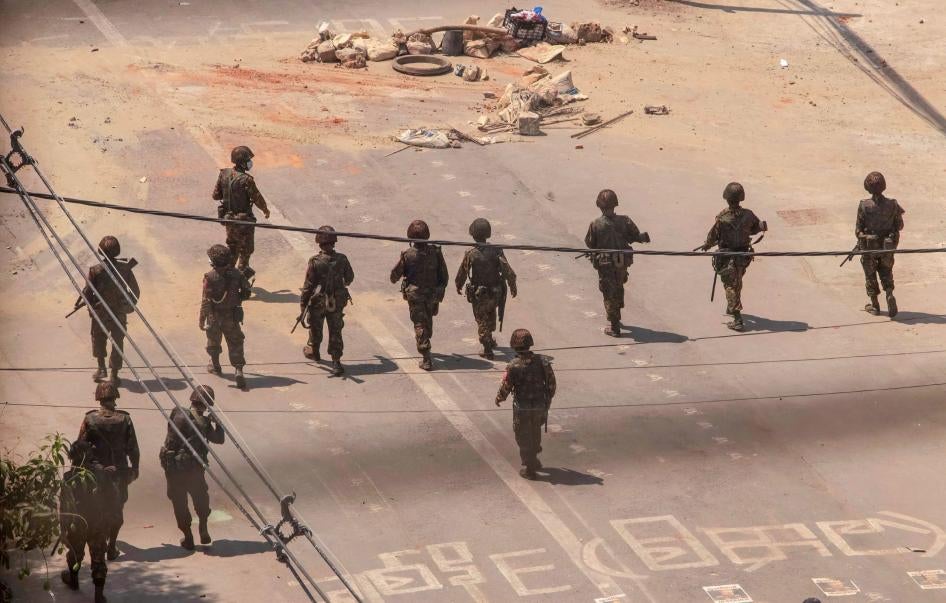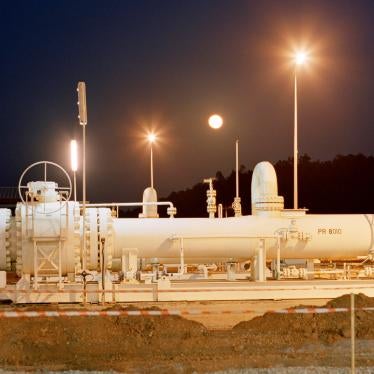(New York) – The European Union should swiftly enforce new sanctions targeting Myanmar’s junta and its state-owned oil company, Myanmar Oil and Gas Enterprise (MOGE), Human Rights Watch said today. The EU should also ensure that the withdrawals of EU companies complying with sanctions do not benefit the junta. The United States, United Kingdom, Norway, Japan, Thailand, South Korea, Australia, and other countries should quickly adopt similar measures.
On February 21, 2022, the EU imposed new sanctions on junta officials, junta-linked “cronies,” and junta-controlled businesses including MOGE, which partners with international energy companies in the oil and gas sector.
The new sanctions will require several energy companies to terminate their operations in Myanmar, a significant impact since natural gas earnings are the Myanmar junta’s single largest source of foreign currency revenue. However, ambiguous provisions raise concerns that companies might transfer their stakes to MOGE or to other companies not subject to sanctions.
“If energy companies leaving Myanmar end up transferring their ownership shares or revenues to MOGE’s benefit, this will only further enrich and entrench the abusive and brutal junta,” said John Sifton, Asia advocacy director at Human Rights Watch. “The sanctions are meant to pressure the junta, not to allow TotalEnergies, Chevron, and others to bolster military rule.”
Since the military coup on February 1, 2021, the junta’s crackdown on opposition has seen mass killings, torture, sexual violence, arbitrary arrests, and other widespread and systematic abuses amounting to crimes against humanity. Continuing military attacks in the country’s ethnic areas have resulted in numerous war crimes.
Companies’ responsible exits from Myanmar should include placing companies’ existing shares or property rights into trust or escrow to ensure the revenues from those shares do not benefit the military. This includes shares of existing exploration or development projects or production or pipeline transportation ventures, Human Rights Watch said.
This is consistent with their responsibilities under the United Nations Guiding Principles on Business and Human Rights, whose commentary states that factors to consider in determining “appropriate action[s]” in cases in which business activities are enabling rights abuses include consideration of “whether terminating the relationship with the entity itself would have adverse human rights consequences.”
TotalEnergies, Chevron, and Woodside have each stated recently that they plan to withdraw from Myanmar in the coming months. TotalEnergies, headquartered in France, and Chevron, in the US, are involved in joint operations with MOGE related to offshore gas production and delivery to Thailand. Australia-based Woodside has exploratory and production rights in several other offshore gas fields. The company ENI, based in Italy, is involved in onshore oil production.
Transferring ownership shares to MOGE or a third party outside of EU jurisdiction would have negative consequences by increasing MOGE’s ownership shares and future revenue, strengthening the junta’s resources and capacities. Myanmar’s military uses its foreign currency revenue primarily for the military’s benefit, Human Rights Watch said.
The new EU sanctions appear to prohibit transfers or sales of shares to MOGE, since it is a “sanctioned entity.” However, the measures also temporarily authorize “making available” to MOGE “economic resources” when EU authorities determine that doing so is necessary for “the transfer before 31 July 2022 of shares or interests necessary for the termination of contracts” with MOGE. The ambiguous wording, apparently meant to temporarily license incidental transactions companies make while exiting, could be interpreted to authorize transferring shares to MOGE and should be clarified.
EU governments implementing new sanctions applicable to MOGE – in particular, the French and Italian governments since TotalEnergies and ENI fall under their jurisdiction – should make clear to companies that their ownership shares cannot be transferred or sold to MOGE.
Companies should urge other energy companies remaining in Myanmar, including current joint venture partners, to place future revenue shares to MOGE into trust or escrow accounts as well. Thailand’s state-owned PTT and South Korea’s POSCO, the two main energy companies remaining in Myanmar, should signal their support for such measures. The largest gas revenue payments to junta-controlled accounts are made via PTT, which purchases approximately 80 percent of Myanmar’s exported natural gas.
If exiting companies determine that they must sell or transfer their shares to another business entity, they should ensure that entities receiving such shares will respect international sanctions and follow international standards on business and human rights.
Human Rights Watch has previously urged other companies exiting Myanmar, including the Japanese beverage company Kirin, to ensure that their shares are not transferred to the military or sold or transferred in a way that benefits the junta.
To help prevent other companies or Myanmar authorities from undermining sanctions, other governments should follow the EU’s lead and impose similar measures specifying that transfers of ownership to the junta are prohibited, Human Rights Watch said. Additional sanctions would also help ensure that the junta isn’t able to evade the new EU sanctions in other jurisdictions.
“The overarching effect of the EU’s new sanctions is to restrict the junta’s access to MOGE revenues,” Sifton said. “Myanmar’s military won’t improve its rights record until the economic impacts of sanctions become too great to bear.”








